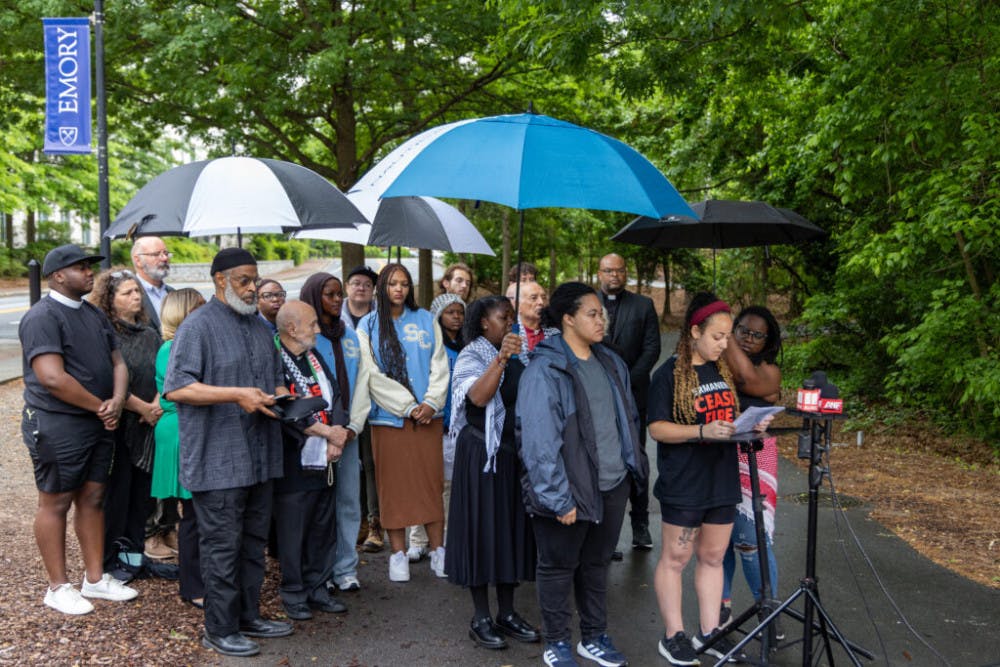As first-year orientation comes to a close, echoes of last spring’s student-led pro-Palestinian protests remain on campus. On Aug. 24, an unknown party chalked messages on campus stating “Emory arrests profs” and “Emory teargasses students.” The messages, which were found on Eagle Row and in front of the Emory Student Center, referenced the encampment that was removed from the Quadrangle last spring when law enforcement officers released irritant gas and arrested 28 demonstrators.
This comes amid allegations of hostility against anti-genocide students at Emory University. On Aug. 14, the Council on American-Islamic Relations (CAIR) and the American-Arab Anti-Discrimination Committee designated Emory, the George Washington University (D.C.) (GW) and the University of California, Los Angeles (UCLA) as “institutions of particular concern” because of their alleged “creation of a hostile campus environment” for community members who stand against Israel’s role in the ongoing genocide in Gaza.
In a press conference, CAIR Research and Advocacy Director Corey Saylor said that Emory, GW and UCLA have “set the standard for creating a thoroughly hostile and dangerous environment for anti-genocide students, faculty, and staff, especially Muslim and Palestinian community members.”
“For students considering these three universities, we urge you to look at other institutions, where free speech and academic freedom are respected values and not just empty words,” Saylor said.
CAIR Research and Advocacy Creator Farah Afify said that at the three institutions, CAIR witnessed multiple reports of ethnic, racial and religious discrimination targeting Palestinians, Muslims and Arabs that went ignored by university administrators.
“There was a culture in which discrimination and harassment towards Palestinian Arabs and Muslims was reportedly permitted and even enabled,” Afify said about Emory.
This announcement follows CAIR-Georgia and Palestine Legal’s April filing of a federal civil rights complaint against Emory for fostering a “hostile anti-Palestinian and Islamophobic environment.” The two groups submitted the complaint on behalf of Emory Students for Justice in Palestine (ESJP), which stated that Emory failed to properly investigate its reports of bias, according to an April 5 CAIR-Georgia press release.
According to a board member of ESJP who requested to remain anonymous due to safety concerns, being Muslim, Arab or pro-Palestine on campus is “very isolating.”
“I remember thinking last year, if I was a freshman, I would have transferred,” the board member said. “We have each other as a community, but to feel that your own administration, your own school, is repressing you is a very, very tough feeling to get used to.”
The member said they believe Emory is a “particular concern” to CAIR because of University President Gregory Fenves’ treatment of protesters. They referenced a University Senate meeting on May 1, in which Fenves said that encampments are “not spaces for having these important discussions.”
“He clearly has no concern for the safety of the students or listening to them at all, frankly,” the board member said.
The board member added that the University did not respond to ESJP’s reports of hostility toward Arab students.
In an email to The Emory Wheel, Assistant Vice President of University Communications Laura Diamond wrote that Emory “does not tolerate behavior or actions that threaten, harm or target individuals because of their identities or backgrounds.” Diamond added that Emory has resources to support all students.
This also comes after CAIR-Georgia called for Emory to institute a more inclusive search process for a full-time Muslim chaplain, a position that had remained vacant for three years, on June 24. The letter, which CAIR-Georgia Staff Attorney Keon Grant addressed to Fenves, states that the request is on behalf of Emory’s Muslim Students Association (MSA), Graduate Muslim Student Council and the Muslim Student Search Committee. According to the letter, without an inclusive hiring process, the University is “tokenizing” Muslim students’ involvement and furthering a pattern of exclusion against Muslim students.
Less than a week later, Emory Muslim Chaplain and Director of Interfaith Academic Partnerships Ustadh Dr. Rahimjon Abdugafurov (20G) began his role on July 1. The University appointed Abdugafurov after a seven-month-long search.
MSA did not respond to a request for comment by press time.
“We're witnessing Islamophobia and anti-Muslim incidents on the rise in all sectors of society,” Afify said. “It's really important for university administrators especially to stand up against Islamophobia, anti-Palestinian and anti-Muslim sentiment instead of stoking the flames of more discrimination and harassment targeted at people who are standing up against genocide.”

Sophia Peyser (she/her) (25C) is from New York City, majoring in creative writing and environmental science. Outside of the Wheel, Peyser has worked as a content writer and freelance journalist. You can find her reading Sally Rooney novels or working shifts at a Brooklyn bakery.






